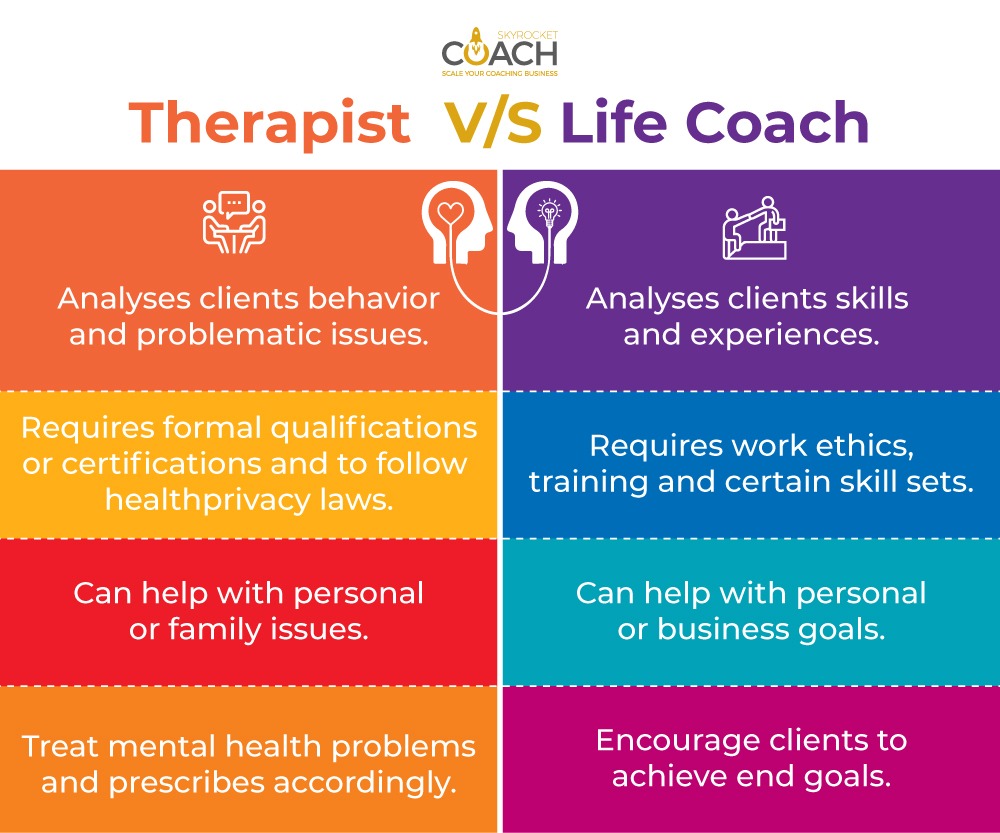
Life Coach vs Therapist – the feud is as old as the coaching business itself. The argument is only fueling and spreading just because people misunderstand the principle and the job Life coaches do separately from a professional Therapist.
For emotional well-being and growth in your life, you could consider therapy as a first step. And it’s possible that you’ve lately heard of life coaches more than you wanted to. In order to achieve personal or professional goals, a life coach helps. The primary goals of life coaching are to help clients feel empowered, motivated, and on track to achieve their goals.
And the Therapists? Therapists and counselors are sought out by people who wish to learn or change themselves. And what else?
In this blog, we will unfold the all secrets including legal and technical differences between Life coaches and Therapists. Spoiler alert! Life coaches versus therapists’ argument is a stalemate.
Table of Contents
What is a life coach?

What is the definition of a Life Coach? Where is the fine line between a Life Coach and a Therapist? How do Life Coaches operate? Let’s see who Life Coaches actually are.
Life coaches are trained professionals who help people reach their full potential so they can reach their goals. One can think of a life coach as a mentor, an advisor, a guide, or a trusted partner for working together.
As a Life coach, you will be in charge of your clients’ life lessons, help them figure out their long-term goals, watch how they think, question their reasons, and push them to make the right choices at the right time.
Seems oddly familiar? Then let’s see who Therapists are.
What is a Therapist?
 What is a Therapist?
What is a Therapist?
Therapists are licensed health care professionals who help people with mental health problems. They do this by helping people deal with trauma and figure out current behavioral problems, such as harmful beliefs, behavior patterns, emotional problems, emotional routines, etc.
In therapy, which is also called psychotherapy or counseling, therapists and patients work together for a long time. Therapist and client work together to get past problems that get in the way of living a healthy, happy life.
Still not convinced? What if we mark their differences with 4 bold colorful lines in one image?
4 Key differences between a Life Coach and a Therapist

Life coaches and therapists both help their clients improve the quality of their lives, but in different ways that work well together. The main difference between counseling and life coaching is that life coaching puts more of an emphasis on the client’s own goals and successes.
But that’s not all. These 4 points are the key differences between a Life coach and a Therapist that should be enough to convince you about their distinctions –

What do life coaches do?

Getting a life coach might help you get better at managing your time and coming up with new ideas. So that their clients can have healthy relationships with other people, they help them deal with tough situations, find a better balance between work and life, and feel better about themselves. Life coaches try to help their clients find the best job path for them.
What are some things that a life coach does not have to do? People’s problems with their emotional health can’t be fixed or made better by a life coach. Life coaches can’t tell their clients what to think or feel, but they can point them in the right direction and help them get there.
What do therapists do?

Therapists don’t just help their clients heal from past traumas; they also often look into why their previous relationships, whether professional or personal, have been harmful or difficult. Therapists help their clients get over feelings of sadness or worry that make it hard for them to do well at home or at work. Therapists can also help after a breakup or the death of a loved one.
During treatment, a therapist’s job is to help you learn the skills you need to deal with your emotional health problems. Therapists help their patients improve their ability to think and pay attention. Psychoanalysis helps them figure out how the past of their clients affects them now. Couple’s therapy could also help them get over past hurts and make their relationship better.
A patient is making progress in treatment when their mood gets better, their anxiety goes down, they start eating better, and they feel better overall.
When to see a life coach?

The choice of whether or not to hire a life coach or therapist is personal and up to the person. Let’s say you’re hiking up a mountain. For your trip, you might need to hire a guide, sherpa, or doctor. But ultimately, the choice is yours to make.
So when to see a life coach? Getting a life coach might help you get out of a rut and set goals you can actually reach. You might want to change the way you go about your work. You might be bored with living your life on autopilot and want a new challenge or a way to change things up a bit. You might want to stop doing bad things and start doing good things instead. In these situations, you can only get help from a life coach.
Your inner critic is getting in the way of your happiness, so you should learn how to shut it up. You want to live a life with meaning, but you don’t know how to start. It doesn’t matter if you’re trying to improve your own accountability or the accountability of your business. All of these goals can be reached with the help of a good life coach.
When to see a therapist?

A therapist can help you deal with anxiety, sadness, trauma, and eating disorders, which are all common signs of mental illness. You may be looking for healing from wounds or traumas from the past. You might need help dealing with your feelings.
It’s possible that you’ve been having trouble with other people and are looking for ways to make your mood better. If you and your partner are having trouble, couples therapy might help. You should talk to a therapist for help in this situation.
Can a therapist act as a life coach?

Simple Answer? No.
Life coaches are responsible for a wide range of things, while therapists only focus on a small part of that area. They have a lot going on, that’s clear.
Even so, it is not uncommon for a therapist who has worked in the field to become a life coach. Therapists and social workers who are tired and irritable or who have reached “burnout” should get professional help. Or, if you want to be one but are underpaid and overworked like I was, it’s fine to have many jobs while you climb the corporate ladder. This is shown by the real-life story of John Kim, a clinical psychologist who became a life coach (The Angry Therapist). Could it be that a life coach like him could also help you?
Similarities between a Life Coach and a Therapist

Even though there are some similarities between the jobs of a life coach and a psychotherapist, they are very different.
The goal of both businesses is to give their clients the tools and information they need to improve their quality of life and work. Therapists often look at therapy and diagnosis through the lens of health care, but their patients don’t have to be sick to benefit from their services. In reality, many people who are in good mental health go to therapists and life coaches for help and advice. In some types of therapy, like addiction treatment, the goal is to break a pattern of behavior.
Therapists and life coaches have different jobs, even though they have some similarities.
Myths about Life coaches and Therapists

The myths are always there to confuse the general audience about everything. So we thought maybe debunking some myths will solve some issues and answer some questions all around.
Myth 1: Therapists only treat people with mental illness
Your desire to get over depression or heal from trauma is just as important as your desire to reach your full potential and reach your goals, and good therapists don’t think that the second is more important than the first. Many psychotherapists use sliding rates to help their clients pay for the personal development work they do with them.
If you want to see a therapist but don’t have a mental illness that can be diagnosed, that therapist won’t be able to bill your insurance company. The only catch is this. Because of this, many therapists choose not to take insurance because they want to keep their business model the same for all of their clients, some of whom have mental health disorders and some of whom don’t.
Myth 2: Life coaches focus on the future, unlike therapists
A therapist can and often will help you figure out what happened in the past. Your therapist can help you figure out what’s going on and move on.
That doesn’t mean they always will, though.
It is true that some types of psychotherapy put a lot of focus on the here and now. Therapists often teach their clients how to get back in touch with the present moment in order to help them deal with anxiety. For treatment to work, you don’t have to talk about your past or your family.
Myth 3: Life coaching = Therapy
Because of their training, therapists are qualified to help people with their lives. But life coaching is not the same as therapy. More and more therapists offer life coaching as an extra service.
Therapy is good for you. It helps you grow and learn about yourself. After therapy, people may “feel better.” A therapist gives you a safe place where you don’t have to worry about how you’re doing at work or at home.
Therapy helps people make new connections in their minds.
You need a coach to do well. It helps you grow and get things done. With the help of a life coach, it is possible to “do better” in life. A coach is someone who keeps you on track with your goals and gives you support. A coach can help you do things like write a book, lose weight, or set goals.
Life coaching can help you get past problems and reach your full potential.
Overview
Either coaching or treatment can help a person grow. If you have an expert on your side, you might be able to handle tough situations better. If you have enough money, you can choose which one to work on.
When doing your search, think about the accreditation, types of sessions, and goals. If you’re not sure which service to choose, you can set up a meeting with each professional to find out more.
Frequently Asked Questions
1. What is the salary difference between life coaches and therapists?
⇒ There is a significant amount of difference in salaries between these 2 sectors. Your insurance may pay for all or part of your therapy sessions. Many therapists accept insurance. Check to see if the therapists you’re thinking about are covered by your insurance and ask how much they charge. Sessions cost between $75 and $200.
Depending on the coach’s specialty, the length of the program, and other factors, the fee can range from $100 to $15,000 or more.
2. How is life coaching different from therapy?
⇒ Life coaches and therapists both help their clients improve the quality of their lives, but in different ways that work well together. The main difference between counseling and life coaching is that life coaching puts more of an emphasis on the client’s own goals and successes.
But that’s not all. Check out our Difference Between Life coach and Therapist table to learn more.
3. Why do therapists hate life coaches?
⇒ Therapists often think that life coaches don’t have the qualifications they need to work and can only give tips & tricks and vice versa. But that’s just not true.
The goal of a therapist is to treat mental health problems, while the goal of a life coach is to give someone the skills they need to improve themselves on a personal level, not to fix the emotional problems they are having.




Recent Comments